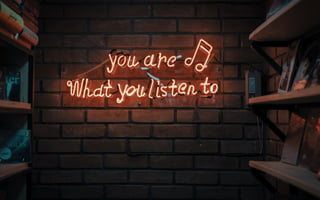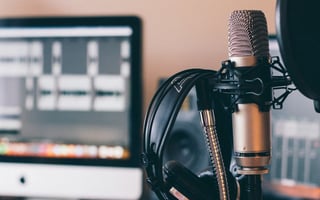When it comes to thought leadership, podcasts continue to go from strength to strength.
Podcasts are going from strength to strength.
There are now more than a million active podcasts and 30 million podcast episodes.
And in the UK, podcasts now reach an audience of 15.6 million people.
So, it is perhaps not that surprising we are increasingly asked to provide media training for people who are about to appear on podcasts.
Or that our sister company – content creation agency Thirty Seven – is increasingly being asked to help their clients to produce podcasts.
Don't have time to read this blog? You can listen to it here:
Being asked to appear on a podcast is not the same as being asked to go into a radio studio and give a live interview. And, while it may appear more relaxed, it can still feel daunting.
Here are some of our key tips to ensure your spokespeople can be good podcast guests:
Before:
Get the right gear
It doesn't matter how good your spokesperson is at podcast interviews, or how interesting their subject is - if their audio is poor, people are going to be prevented from listening.
Make sure they have a decent microphone and a set of headphones for the interview.
They also need to make sure they have somewhere where they can record away from loud noises. If they struggle, see if they can record under a duvet (a technique many broadcast journalists use) or get them to revisit their youth and build a pillow fort around the microphone to help absorb the sound.
Listen
Make sure your spokesperson has listened to a couple of episodes of the podcast they are due to appear on.
This will help them to become familiar with its format and style. Is it educational? Entertaining? Topical? Niche?
It will also make them more aware of the types of questions they may face and how long they will need to talk.
Plan
You don’t want your spokesperson to come across as sounding scripted when they appear on a podcast.
But, just like any media interview, they need to be clear on what they want to get across and consider what they might be asked.
A temptation with podcast interviewers, with their more relaxed feel, can be to ask to see the questions in advance.
While that can provide some reassurance, it should be avoided. Spokespeople who see the questions are likely to rehearse their answers and when they do that, they will sound scripted when the podcast is recorded.
Practise
Practise makes perfect.
So, try to make sure your spokesperson does a run-through ahead of their podcast interview.
It will help them to ensure their technical set-up is working and enable you to evaluate how they perform.
This preparation should involve finding out how the podcast will be recorded and ensuring your spokesperson is comfortable with any technical aspects they may be asked to do.
For example, in the current virtual world, podcasts may be recorded on Zoom, Skype or Google Hangouts.
And many podcasting producers are now using software such as riverside.fm which provides a much higher quality of audio.
Or they may be recorded as a ‘double-ender’, where each person records themselves (using things like Descript, Audacity and Quicktime) and the audio is put together in post-production. Podcasts can also use audio recordings from smartphones where the spokesperson will need to send their file over.
Another good practise option is to consider using the new social media platform Clubhouse to practice speaking in public. It is an audio-only channel where you can listen to and take part in conversations. It has been described as being like listening to a live podcast.
Online training courses
Making professional videos on your smartphone to engage your audience and tell your story.
Read more
Need to produce words that stand out in a crowded market? Learn from our team of current working journalists.
Read more
How do you feel about being asked to speak in public? It doesn't have to be something we endure.
Read more
How would you react if your organisation found itself in a crisis? Good crisis planning has never been more important.
Read more
During:
Conversation
On our media training courses, we often talk about the importance of spokespeople striking a conversational tone.
With podcast interviews, that conversational tone is even more crucial. Even niche trade industry podcasts tend to have an informal, fireside chat-style feel.
The key is for spokespeople to be natural to use the same language they would if they were chatting with a friend, or colleague, over coffee or in a pub.
It also means treading carefully with notes. While it can be reassuring to have them by your side, it can be easy for your spokespeople to fall into the trap of reading them. And that will make them sound scripted and robotic.
Stories and anecdotes
The average live news radio interview is about two and a half minutes long.
Podcast interviews are unlikely to have the same time constraints.
Your spokesperson could be interviewed for around 45 minutes. Some podcasts are 90 minutes long and feature the guest all the way through.
This means there is greater scope to get messages across and share stories and anecdotes.
These will help your spokespeople bring their messages to life, add credibility to proceedings and help them connect with the audience.
Be prepared to get personal
As well as the stories, spokespeople in podcast interviews also need to be prepared to face plenty of personal questions.
Why? Because the intimate nature of the podcast format typically offers greater scope to find out more about the spokesperson, as well as what they want to talk about.
So, while your spokesperson may want to talk about a new service or product, many of the questions could be about the person behind it.
Listeners want to find out more about the person who is in their ears.
Personal questions, even those that appear innocuous, can be tricky for spokespeople. And there have been plenty of examples of people being tripped up by them in different media formats.
So, podcast guests need to spend time thinking about these types of questions and planning how they would respond to them. Think about questions like these:
What is your biggest failure / mistake?
What would you have wished you had known at the start of your career?
What is the most common myth about your industry?
What is the biggest challenge you have in your role right now?
Messages
When we cover radio interviews on our media training courses, we stress the importance of getting messages across early.
This is partly because of the time constraints of the format. And, also, because the audience is likely to be multi-tasking.
People typically listen to the radio while they do something else, like driving, working or cooking.
They dip in and out of what is being said.
Podcasts are different. The audience often subscribes to them, is invested in them and can listen to them when it is convenient.
Some people have specific podcasts for when they are working, going for a run or trying to get to sleep.
They can pause it and stop it when, and as often, as they like. Podcast are also more likely to be listened to through headphones, which raises that intimacy level and means the audience is more likely to actively listen.
This means the interviewee can be more relaxed about getting their message across and can wait for more natural opportunities to use it.
Ask a few questions
You would not find us recommending spokespeople ask questions to the journalist during our media training courses.
But podcasts, as we have already said, are different.
The scope for longer interviews can naturally lead to more natural conversations. And conversations normally involve more than one person asking questions.
So, don’t be afraid as a podcast guest to ask a few questions back to the host.
Longevity
Podcast interviews have a different shelf-life to broadcast ones. While news interviews are quickly dated, podcasts don’t age in the same way.
They are not necessarily consumed as soon as they come out. People may listen to them weeks, months and even years later.
So, spokespeople need to take care to avoid saying anything too time-sensitive.
Smile
One of our current working journalist tutors says “you can hear a smile on the radio”.
It sounds weird, but it helps to bring that all-important energy and enthusiasm into an interview.
And the same applies to a podcast, where it can also help to create warmth.
The audience will sense if you are talking with a frown.
After:
Promote
Find out when the podcast is being published and promote it through your organisation’s social media channels.
Review
People often feel uncomfortable watching or listening to themselves.
But reviewing any media appearance is a crucial way of identifying what went well, what could have gone better and what could be done differently next time.
You could also ask the podcast host for feedback on how your spokesperson performed.
They may have a different interpretation of how the interview went and could provide some useful advice.
If the podcast covers a niche subject, they are likely to want to speak to your organisation again in the future. So, it is in their interests to be speaking to confident guests.
If your organisation is looking to do more podcast interviews as part of its comms strategy, speak to one of our account managers about bespoke training to help ensure you make the most of the opportunity.
And if your company would like some help in creating a podcast for itself then please check out Thirty Seven.
How would you react if your organisation found itself in a crisis? Good crisis planning has never been more important.
Media First are media and communications training specialists with over 35 years of experience. We have a team of trainers, each with decades of experience working as journalists, presenters, communications coaches and media trainers.
Subscribe here to be among the first to receive our blog.




